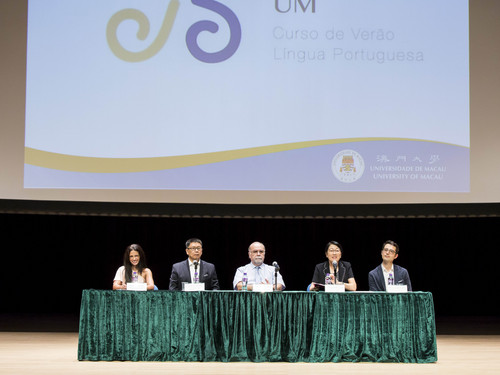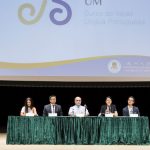 UM’s 31st Portuguese Language Summer Course opens today
UM’s 31st Portuguese Language Summer Course opens today
The opening ceremony of the University of Macau’s (UM) Portuguese Language Summer Course, organised by the Department of Portuguese under UM’s Faculty of Arts and Humanities (FAH), was held today (17 July) in UM’s University Hall (N2). FAH Dean Prof Hong Gang Jin said that this year’s course has invited 23 instructors from different parts of the world, who are all proficient speakers of the Portuguese language, in order to expose the more than 450 students from ten countries and regions to different cultures, as well as to help them develop four critical skills, namely communication, collaboration, critical thinking, and creative thinking, so they can become competent global citizens.
Guests attending the ceremony included Sou Chio Fai, director of the Tertiary Education Services Office; Maria Helena de Senna Fernandes, director of the Macao Government Tourism Office; José Wong, acting director of the language promotion centre under the Education and Youth Affairs Bureau; Miguel de Senna Fernandes, president of the Association for the Promotion of Macanese Education (Associação Promotora da Instrução dos Macaenses); Teren Cheong, general manager of the Corporate Banking Division of BNU; Maria Antónia Espadinha, vice rector of the University of Saint Joseph; and Yao Jingming, head of UM’s Department of Portuguese.
At the ceremony, UM Vice Rector (Research) Prof Rui Martins welcomed students from different parts of the world. Prof Martins said that UM’s Department of Portuguese is the largest in Asia and has successfully produced many Portuguese language professionals over the years, adding that Portuguese language skills give students an advantage in their future studies and career development. Prof Jin noted that UM’s Portuguese Language Summer Course has graduated many students, including Sou Chio Fai, director of the Tertiary Education Services Office, who was among the second cohort of students. Prof Jin also pointed out that the more than 23 instructors of the course come from different Portuguese-speaking countries, bringing with them a rich variety of cultures and linguistic variations as well as different perspectives and communication styles, and this will in turn expose students to different cultures, improve their knowledge of the Portuguese language, and allow them to creatively apply the skills in real life.
The course aims to help students enrich their lives during the summer holiday through intensive Portuguese language lessons and interactive cultural activities. In addition to lessons in the classroom, all participants in the course will have the opportunity to take part in cultural exchange activities, such as Portuguese folk dance, choral singing, fitness exercises, and lectures on the history of Macao. This year the cultural programme will include visits to local museums and the Historic Centre of Macao, as well as a seminar on Macao’s cultural heritage.
The three-week course, to be held from the 17 July to 4 August, will cover several levels: beginners, basic, intermediate, and advanced. In addition, the course will offer lessons at the superior level and will include a class in Chinese-Portuguese translation.
Since its establishment, the Portuguese Language Summer Course has been actively promoting Portuguese language and the cultures of Portuguese-speaking countries. The course creates a unique intercultural environment for students to learn about the historical, social, economic, political, and cultural developments of Macao. This year’s course has attracted more than 450 students, the highest number in 31 years, from mainland China, East Timor, Thailand, the United States, South Korea, Moldavia, India, Hong Kong, and Macao.


